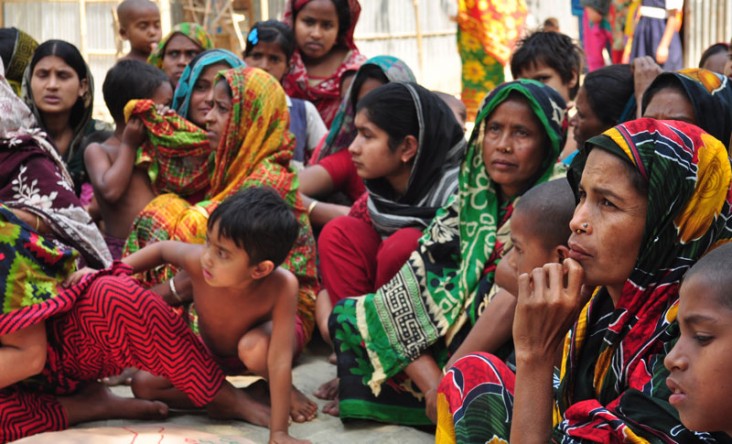- What We Do
- Agriculture and Food Security
- Democracy, Human Rights and Governance
- Economic Growth and Trade
- Education
- Ending Extreme Poverty
- Environment and Global Climate Change
- Gender Equality and Women's Empowerment
- Global Health
- Water and Sanitation
- Working in Crises and Conflict
- U.S. Global Development Lab

USAID works across the globe to improve health outcomes in a wide range of areas. USAID is committed to ending preventable child and maternal deaths, creating an AIDS-free generation, and protecting communities from infectious diseases.
While biology and physiology are important contributors to an individual’s health, the social determinants that shape human interaction also play an important role in health at the individual, family, and community levels. These factors include knowledge, attitudes, social and cultural norms and conventions, and behaviors.
Social and Behavior Change Interventions
Improving the quality or coverage of health products and services is not, in many cases, sufficient to improve health outcomes. Doing so also requires changing the health-seeking behaviors of individuals and communities, as well as the norms that underpin those behaviors. Interventions that seek to change behaviors by addressing factors such as knowledge, attitudes, and norms, known collectively as social and behavior change interventions, complement and enhance the role played by services such as HIV counseling, testing, and treatment; voluntary medical male circumcision; provision of antenatal care; or provision of family planning services. Social and behavior change interventions are critical to ensuring that those most in need can access available services and products.
Social and behavior change interventions shape not only demand, but also communication between health providers and clients, families’ and couples’ communication, and the engagement of community leaders and other influencers in promoting the adoption of healthy behaviors and practices. Communities, families, and healthcare workers armed with the right skills and information can maximize access to lifesaving commodities and high-quality health services.
Social and Behavior Change at USAID
Through social and behavior change activities, USAID and its partners raise awareness, reduce misinformation, and address the barriers that prevent individuals, families, and communities from practicing lifesaving behaviors to improve health outcomes. USAID investments in social and behavior change include programs that operate across a wide spectrum of approaches:
- Increase demand for or utilization of available commodities and services
- Foster sustained changes in behavior by shifting attitudes, addressing norms, and reducing barriers to consistent practice of healthy behaviors
- Support healthcare workers by building skills and addressing biases that present barriers to care
- Build capacity of organizations and governments to implement and manage SBC interventions in priority countries.
USAID’s social and behavior change activities operate primarily within four key technical areas:
- Maternal and child survival
- Family planning
- Creating an AIDS-free generation
- Protecting communities from infectious diseases (coming soon)
In addition to numerous programs and projects that operate within specific health arenas, USAID supports activities that operate across the health sector:
- TRANSFORM. TRANSFORM, a 5-year (2014–2019), multiple-award indefinite delivery/indefinite quantity (IDIQ) contract, is designed to infuse innovative practices from a range of disciplines into USAID-supported social and behavior change activities in maternal and child health, nutrition, tuberculosis, infectious diseases, and HIV and AIDS. TRANSFORM’s partners make up 5 contract teams and include nearly 30 organizations with expertise in marketing, advertising, human-centered design, social psychology, and behavioral economics, among other fields.
- Health Communication Capacity Collaborative. The Health Communication Capacity Collaborative (HC3) is a 5-year global project funded by USAID to strengthen the capacity of developing countries to implement state-of-the-art social and behavior change programs. HC3 addresses health areas including family planning and reproductive health, child survival, maternal and child health, HIV and AIDS, Ebola, and infectious and non-communicable diseases. The project also offers technical expertise in social and behavior change for gender equity and integrated programming across sectors including environment and democracy and governance.
History of USAID Involvement
In June of 2013, USAID, in collaboration with UNICEF, hosted the Evidence Summit on Enhancing Child Survival and Development in Lower- and Middle-Income Countries by Achieving Population-Level Behavior Change. The goal of the summit was to determine which evidence-based interventions and strategies support a sustainable shift in health-related behaviors.
The results of the summit were published in 2014 in a special supplement in the Journal of Health Communication. These results and other reviews provided the global community and health practitioners worldwide with valuable evidence to inform the design of social and behavior change programs. USAID has continued to build on the evidence established during the summit and to work with partners to achieve important population-level behavioral shifts that contribute to our goals to improve health outcomes in countries around the world.
Additional Resources
Learn more about USAID’s activities in the following areas:







Comment
Make a general inquiry or suggest an improvement.